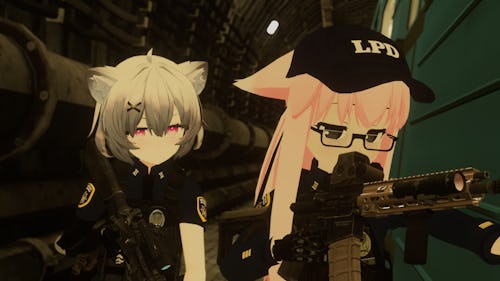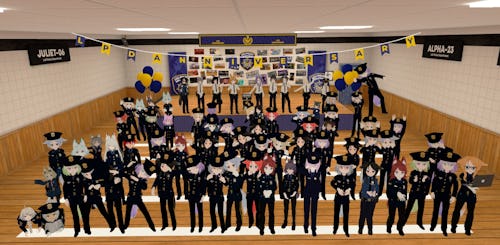
Early last year, Jura was at the spa, chilling in a communal bath and having a casual chat with friends, when the Loli Police Department burst into the building.
He and his pals froze at the sight of the group, clad in uniforms and brandishing guns. The LPD had come to the spa to arrest a wanted criminal, and the person in question wasn’t going down without a fight.
Before Jura had time to react, he was witnessing a hostage situation. The criminal grabbed an innocent bystander and started making demands to negotiate his escape. Suddenly, shots rang out, and an LPD officer hit the ground. The police team called for backup — and shortly thereafter, the LPD’s SWAT team stormed the building. Eventually, the hostage was freed, and the criminal was taken to jail.
Jura thought what happened was hilarious — after all, the whole thing was a roleplay, and the criminal was in on the game. The LPD is a fake law-enforcement agency that prowls the various worlds of the VRChat platform, which has an average of 20,000 concurrent users at any given time.
“I can pull out a bag of weed and make it look like it came out of someone’s pocket. They always say it’s not theirs.”
“It was so theatrical — an entertaining piece for everyone, really. Then, once the criminal had been put away and the roleplay had ended, the members took the time to speak to all the witnesses,” says Jura, a 22-year-old computer science student from Scotland. (Input is withholding the last names of interviewees for their privacy.) “It impressed me a lot. And when I showed interest, they were more than happy to talk me through joining. Funnily enough, I spend most of my day-to-day with those people now.”
There now are nearly 11,000 members on the the LPD Discord. The group, which gets its name from “lolis” — the young-looking anime girl avatars members use — is the most prominent police roleplay group in VRChat. The tightly run community allows members to experience a fantasy version of police life and prides itself on being a source of chaotic good in the strange world of virtual reality.
The department began in 2018 as a joke among friends. At the time, too many people were using Ugandan Knuckles — a tiny red character from the Sonic franchise — as their avatar, a trend that “everyone in the VR world found super-annoying,” according to former LPD captain Hrólfur, a 20-year-old who lives in Iceland and studies computer science. “So the original LPD staff used to go around trying to arrest those people.”
The LPD, an all-volunteer force, has evolved since then. Members move through the ranks — from cadet on up — based on their activity level, which is tracked via the group’s Discord. Everything is carefully orchestrated to mimic IRL police.

“We have two-hour patrols where we break up into squads, go out into the world of VRChat, and interact with people to start roleplays,” says Jura, who is now a sergeant in the LPD and runs the training program for new recruits. There are dispatchers, as well. “They even use sound effects to make it sound like they’re speaking to people through a radio,” he says.
Karet, a 29-year-old game developer and LPD captain from Texas, says that the hard work of volunteers allows users to roleplay police activities in a realistic environment. “We have some of our own worlds — like the hospital for our medical division, where we can pretend someone is getting treatment, or the jail where we put criminals,” says Karet, who designed the LPD station and jail.
One of Karet’s favorite things to do is mess with users at random. “Lots of people in VRChat like to sit in front of mirrors,” he says. “I will go up to the mirror and do a ‘mirror inspection.’ Then I say it’s an illegal mirror and start looking for someone to blame and arrest. They just don’t know how to handle that,” he laughs.
There are other ways to get people into trouble, too. “I can pull out a bag of weed and make it look like it came out of someone’s pocket,” Karet says. “They always say it’s not theirs.”
‘F*** the police’
Being a VRChat police officer comes with its share of challenges. Members are aware that their form of roleplay — which frames spot checks and fake drug busts as harmless fun — doesn’t sit well with some members of the community. “We absolutely get abuse,” says Hrólfur. “Especially when there’s police violence going on in the U.S. We get a lot more people responding and saying curse words to us, like ‘Fuck the police.’”
Despite the power dynamics at play, LPD members are not moderators of the VR world and ultimately can’t make much in the way of real change. “One of our new officers came to me upset because they stepped in when they saw harassment, but then they got the brunt of the attack from the harasser,” says Karet. “I commended him, but it’s not what we do. We’re just trying to have fun. So usually when we encounter something like that, we just leave the world.”
Thankfully, Karet says, the LPD can help their community somewhat. “We encourage LPD officers to help out new users. It’s easy to spot them, so we often go and give them a hand, show them how things work,” he says. The LPD used to run events for this purpose, but they were recently brought to a halt. “The events are on hiatus because it became a bit cult-y. Everyone was trying to recruit people into the LPD.”
The LPD also has some real-world benefits. “I went to school for game development, but I’d never been able to get a job in the industry because I’d never had examples of my work. I got my current job because people saw what I did for the LPD,” says Karet, who now works in 3D design.
He thinks the LPD provides opportunities for its members to build soft skills, too: “A lot of people, when they first join the LPD, they’re really shy. By the end of it, they’ve completely come out of their shell, and they can talk to complete strangers.”
Jura is one of the people who has become more sociable. “I was definitely a lot shyer before the LPD, especially online. It’s made it easier for me to make friends and relationships,” he says.
The student, who now oozes confidence, has even put the LPD on applications for university grants, citing the project management and leadership expertise he’s gained being on the force. “As odd as it seems — given where the skills came from — it’s definitely improved things for me,” he says.
VR Week 2022 is an in-depth look at the decades-long future of VR successes, failures, and innovations to come.
More VR Week 2022 stories:
- How one group is remaking sign language for the VR age
- VR needs to address the huge motion sick elephant in the room
- Hot job alert: metaverse architect
- The 9 best apps to get started working in VR
- There’s no VR internet in our future — at least not one we’d want
- The 11 best hardcore VR games you should play right now
- From ‘The Lawnmower Man’ to Meta: VR’s most important moments







